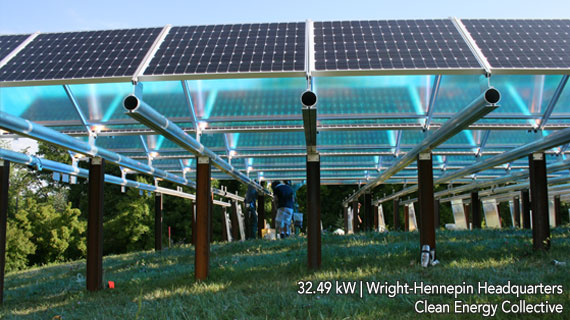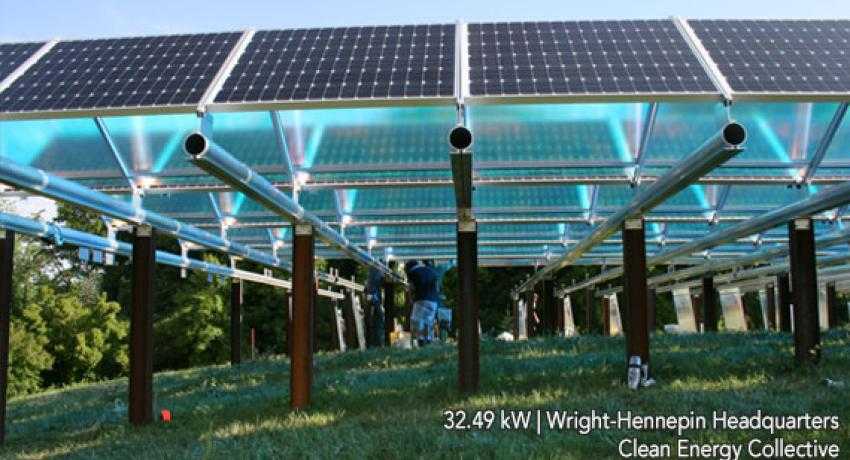Xcel Energy’s Minnesota Solar Gardens Plans Sprout Controversy
 Minnesota’s new law allowing community solar gardens went into effect earlier this year. Now that Xcel Energy—the state’s largest utility—filed its plans for incorporating and providing incentives for solar gardens, the state’s solar industry and Minnesota solar installers are expressing frustration about them. The controversy stems from the fees Xcel wants to charge, as well as the payments the utility wants to offer for power produced by solar gardens.
Minnesota’s new law allowing community solar gardens went into effect earlier this year. Now that Xcel Energy—the state’s largest utility—filed its plans for incorporating and providing incentives for solar gardens, the state’s solar industry and Minnesota solar installers are expressing frustration about them. The controversy stems from the fees Xcel wants to charge, as well as the payments the utility wants to offer for power produced by solar gardens.
Minnesota Gov. Mark Dayton signed the Solar Energy Jobs Act into law earlier this year as part of an omnibus energy bill, HF 729. The bill included language that allowed the development of community solar gardens and required Xcel Energy to file its plans for supporting such gardens by Sept. 30. Last week, renewable energy advocates submitted their responses to Xcel’s proposal. Overall, they were not impressed. The Minnesota Public Utilities Commission will continue to hear comments on the proposal over the next several weeks before making a final ruling on it.
Community solar gardens (CSG) could be an essential option to home and business owners in a state like Minnesota, which is prone to long winters and deep snows, and where many homes aren’t suitable for solar. Allowing people to purchase a piece of a larger array to offset their energy use while still supporting solar is a great option; it’s just that the kinks need to be worked out.
Under the proposal, Xcel would collect a non-refundable $1,200 application fee for a CSG, according to Midwest Energy News, which first reported the story. That’s in addition to a $300 annual participation fee and a $200 per kilowatt charge to cover a deposit and escrow for the system (for a 2.5 megawatt array, that would add up to $500,000). It would also require a metering fee between $5.50 and $8.00 a month, the news source said. Xcel would reimburse CSG owners between 6 to 10 cents per kilowatt hour for the energy their portion of the array generated.
The Minnesota Solar Energy Industry Association (MnSEIA) raised concerns, stating that the current payment scheme for solar gardens in Minnesota, which are reimbursed for energy produced at the applicable retail rate, is ambiguous and won’t allow solar installers to develop enough megawatts of solar power to meet the state’s mandated solar energy requirements.
The applicable retail rate is being used as an interim reimbursement level until the commission decides the Value of Solar Tariff (VOST). “The correct standard the Commission should use when determining the ARR is whether the rate will allow for the ‘creation, financing, and accessibility of community solar gardens” that are “consistent with the public interest,’” MnSEIA wrote in its comments about the proposed rates.
The Interstate Renewable Energy Council (IREC) had concerns regarding Xcel’s proposal as well. “The transition to the VOST, and in particular the treatment of any existing CSGs at that time, still requires additional consideration and discussion,” IREC wrote. “The appropriate interpretation of the term ‘applicable retail rate’ should be an individual participant’s retail rate rather than the average rate that Xcel is proposing.”
IREC said that the applicable retail rate should not be fixed over time. If it were, as other energy rates in the state go up, the CSGs would have less value than other energy sources and would not give community solar garden owners the returns they were expecting on their investments—particularly if used to offset their energy bills.
Still IREC said the proposal isn’t entirely bad. “We believe Xcel’s proposal offers a solid framework for implementing a CSG program, however certain elements could be improved.”
How it will play out over the coming months remains to be seen.




